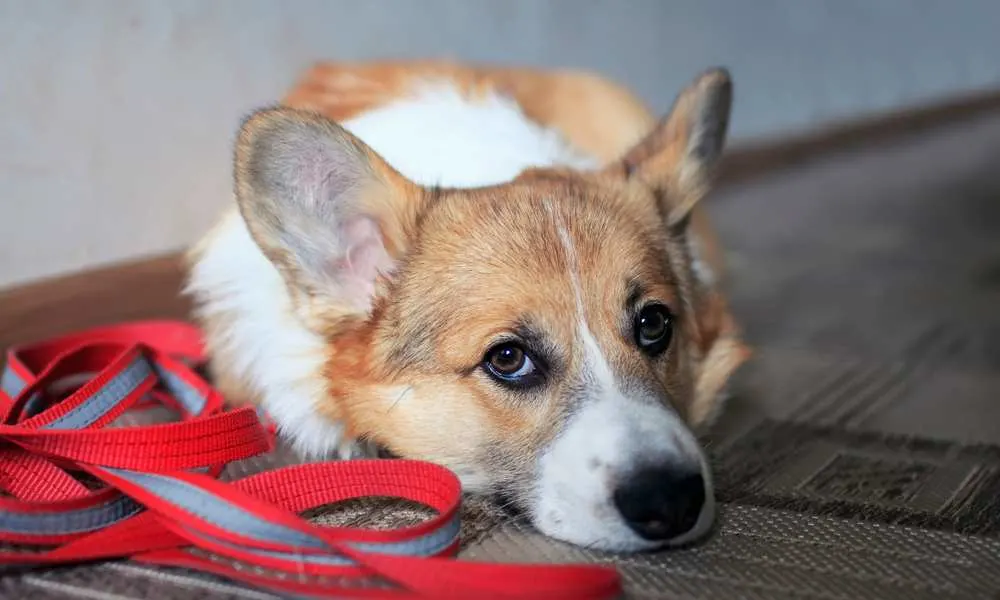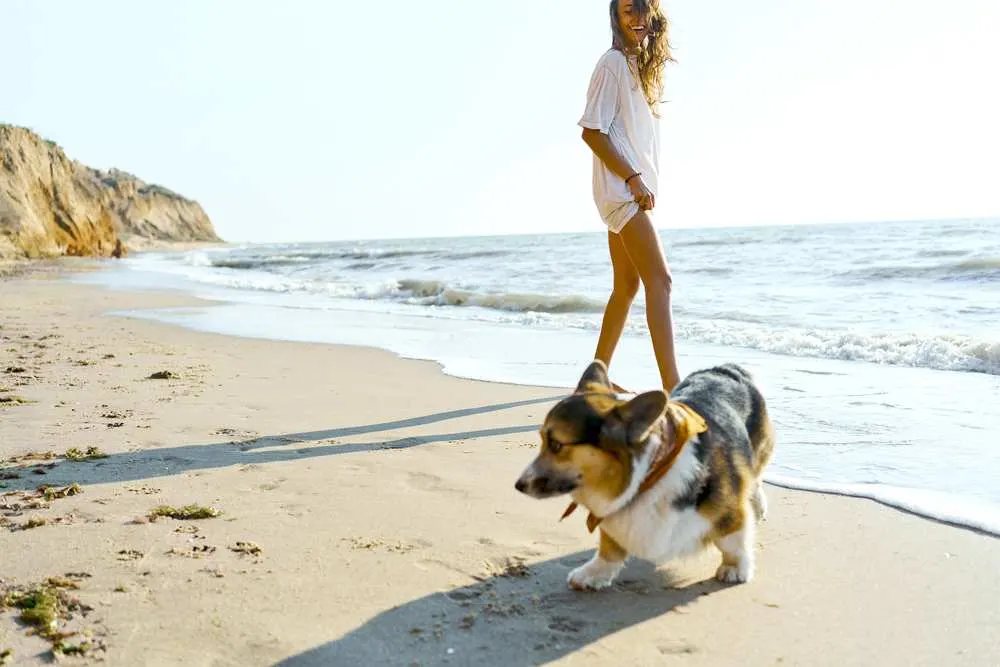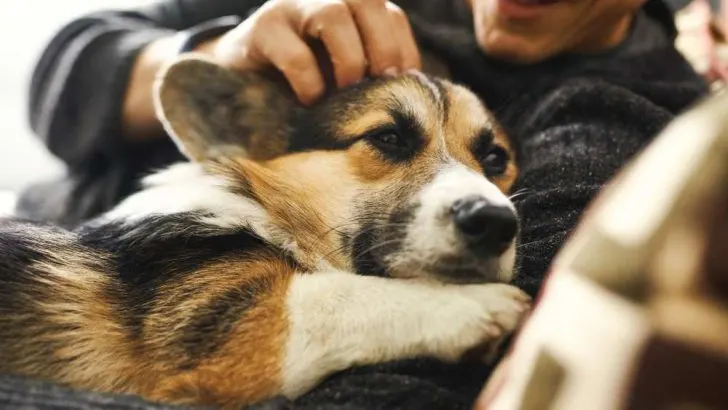You have a feeling that your corgi is following you everywhere you go? You’re probably right, and we know exactly why your corgi won’t leave you alone.
You wake up – your corgi is next to your bed. You go to the kitchen – your corgi follows you. Even when you go to take out the trash – your corgi wants to go with you. Have you ever wondered, “Why does my corgi follow me everywhere?” It’s because this breed can’t stand being left alone. But there’s more to this.
If you are interested in discovering the real reason why your corgi won’t sometimes leave you alone, stick with us, and we will explain everything.

Separation Anxiety
If you have a feeling that your corgi is acting too clingy, the reason for this is probably a psychological disorder called “separation anxiety.” This is a real thing, and it can easily interfere with your corgi’s behavior and training that you’ve both been through.
Separation anxiety can be mild, moderate, and severe. This entirely depends on the level of anxiousness your dog expresses towards you and other family members.
Remember, the more your dog seems to follow you around and acts frightened, the more serious the separation anxiety level is. Pay attention to their behavior.
What Causes Separation Anxiety In Corgis?
- The first and most common reason for this to occur is changing owners – obviously.
If you have adopted a corgi that has been with a different family for a long time, it might be more challenging for it to develop a relationship with the new owner. An estranged environment can trigger separation anxiety.
It can take your corgi a long time to adapt to a new house, a new dog-house, and unfamiliar people surrounding it. Sometimes, this is so hard that dogs just can’t come to terms with being a part of a new family that they refuse entirely listening and obeying the owner.
This can make additional training extremely hard.
- The second reason is a change in an already established schedule.
A change in schedule, especially concerning the owner, can significantly alter your corgi’s behavior. No one likes unexpected changes, and your corgi is one of them.
For example, if you have been offered a different job that required you to be away from home for a long time, or your new job required being out on the field till late hours, your corgi might not take this well.
So every time you come home from work, you’ll find your corgi by your side every second of every minute.
Moving can also affect your corgi in a bad way.
If you have decided to move to another town, or even a country, your corgi might feel frightened. Changing a familiar environment can cause a sense of insecurity in your corgi. You will find your corgi following you literally everywhere.
The absence or the death of a close family member is one of the strongest influences that can lead directly to separation anxiety.
If your corgi was close to someone in your family and that someone has left you, this can affect your dog badly. Corgis are very sensitive pets, and once they lose someone in a close family circle, this can trigger severe separation anxiety.
What Are The Red Flags Of Separation Anxiety?
- Excessive urinating
- Uncontrollable barking or chewing
- Howling
- Digging and destroying objects around the house
- Attempts of escape
- Pacing
- Coprophagia
Now that we’ve listed them down, let’s explain what triggers them.
| Urinating | When dogs are experiencing nervousness, they tend to urinate out of the ordinary. This can be one of the signs of separation anxiety. Your dog might start urinating more often, even if it is trained to leave the house when in need. |
| Barking and chewing | Sudden barking and chewing on objects in the house can be a coping mechanism for separation anxiety. Maybe, your dog is venting by barking at you or chewing on furniture. Be careful not to let this turn into aggression. |
| Howling | Howling can be a sad response to your corgi’s loneliness. Although we connect howling to wolves, don’t be surprised if you hear your corgi making sounds like this. |
| Digging and destroying | After a long day at work and being away from home, you might come to see that your corgi has spent the afternoon destroying the furniture in the house or even digging numerous holes in the backyard. Dogs that suffer from separation anxiety tend to turn their negative energy into chaos. |
| Trying to escape | Trying to escape your home is the most common outcome after you have moved to another city or country. Your corgi might not feel safe in the current environment, so it will try to escape and return to its primary “home.” |
| Pacing | Pacing means that your dog will walk or trot in a specific pattern (often in the circular) when you are not around. This is very common for dogs that suffer from separation anxiety, and if it doesn’t end after a particular time, it could damage their movement. |
| Coprophagia | Coprophagia is when dogs are eating their own feces. Although this can be tied to other disorders, it is also common for dogs that suffer from separation anxiety. Unlike the others, this represents a greater danger to your dog’s health. |
If your corgi is suffering from separation anxiety, there are a couple of practical ways in which you can help and still not make it too overwhelming for them.
Here Is What You Can Do
1. Leaving A “Special” Toy
Some dog professionals recommend leaving some kind of toy to serve as “comfort” while you are away. This toy can also drive your corgi’s attention from you to this new toy. If this proves to be successful, your corgi won’t be following you 24/7.
Luckily, today there is a whole range of toys – both the old-fashioned ones and new smart toys that can keep your dog entertained for a long time.
2. Encouraging “Independent Time”
What is meant by encouraging independent time is getting your dog used to playing independently and spending some “alone time” while it is still a puppy. For this to work, there are specific training methods. What’s more, you need to have a lot of patience.
Corgis are not dogs that love to be left alone, but measures like this are necessary when their clinginess crosses the line.
3. Avoiding Punishment
If you think that punishing your dog for following you around all day will stop them from doing it, you are greatly mistaken. This type of “treatment” will only encourage misbehavior and aggression. You need to switch from pushing something that comes almost naturally to your dog and figure out a different way to minimize the damage.
4. Hiring A Dog-sitter
For those owners that have been experiencing severe cases of separation anxiety with their pet corgi, the best solution would be to hire a dog-sitter – for a limited time at least. This might not be how you wanted to spend your money, but if your corgi is causing your problems, this might be the only way you can solve the problem.
Look at it as hiring a professional and a babysitter at the same time. Times have definitely changed, and there are trained dog-sitters that can “talk some sense” into your dog.
IMPORTANT: Some professionals can recommend treating your corgi by giving him medication. You should never turn to this type of treatment on your own.
If you believe that your dog might need medication, first consult with your vet and see what he has to say about this. Sometimes, medication is completely unnecessary.

Aggression – A Major Factor
Have you ever witnessed your corgi showing aggressive signs after you have warned them for following you around the house all the time?
These situations are pretty common. Your corgi might have a hard time figuring that following you around can be annoying.
After warning your corgi a couple of times, they might start barking at you. Some rare cases with severe aggression including biting the owner. However, separation anxiety is just one of the triggers of aggression in corgis.
Here are a couple of other triggers that can encourage aggressive behavior:
- Herding instincts
- Invading territory
- Feeling sick
- Feeling frightened
- The need for dominance
Since corgis are herding dogs, it can be very hard for them to resist their natural instincts. These involve having everything under control – but under their control. Unfortunately, when you have an owner, things don’t work that way.
As a breed, corgis are extremely territorial, and the slightest invasion of territory can provoke aggressive behavior. Even if you are just trying to fill the water or food bowl, this can be misunderstood.
When feeling sick, corgis can display aggressive signs. This usually involves negative reactions to some medication your dog has been receiving.
Feeling frightened, which is almost a direct connection to separation anxiety, can lead to your dog acting aggressive. This can quickly become a habit, and behavior management is necessary.
If you haven’t properly trained your dog, it might start leaning towards dominant behavior. This can also be the case with spoiled dogs. Whenever they feel that their position is somehow violated, aggressive outbreaks will indeed occur.
You’d be surprised to find out that female corgis are more aggressive than male ones. Puppies can be aggressive also, but with them, it can be managed through adequate training.
With cases like this, it is advisable to pay your vet a visit or hire a behavior specialist. These are trained people that are able to precisely determine the root of your corgi’s aggression, what’s causing it and how to properly deal with it.
Remember: A trained corgi is a well-behaved corgi!l

Let Your Corgi Follow You Here
You can make the most of your corgi following you everywhere. Remember that we are talking about a dog that is incredibly active and friendly.
Your corgi would love to follow you on some fun joint expeditions. So, where can your corgi follow you?
Here are a couple of suggestions where your corgi can follow you:
- A daily walk – Feel free to take your corgi on a daily walk with you. If the weather outside is sunny, and you have a habit of going for a walk, your corgi is a great companion.
- A morning jog – There are people that wake up early in the morning and go out for a 30-minute jog. If you don’t feel like running alone, you can always invite your corgi to come with you. If you are not running too fast, he will gladly accompany you.
- A camping trip – If you have been planning a camping trip with family or friends, taking your corgi with you is a great idea. These dogs have no trouble managing in the woods – this is where their herding instincts kick in. You can use this to your advantage.
- A swim in the lake – One of the best things about corgis is that they can do nearly everything. So even if you are going for a quick swim in the lake this weekend, your corgi will love to jump in the water with you. However, they shouldn’t be too long in there.
You should bear in mind that corgi’s energy level is incredible to start with. Both the Cardigan and Pembroke breed have a lot of energy, but a line can be drawn between these two if we pay some extra attention.
While the Pembroke breed will give you a run for your money, the Cardigan breed will show more subtle energy. It is precisely these high energy levels that enable them to follow you all day long.
These dogs are also very athletic despite their miniature size, so you can take them to sporting events like:
- Herding trials
- Flyball
- Lure coursing
- Dock jumping
- Disc dogs
Professionals recommend a minimum of 1-2 hours of daily exercise with your dog.

